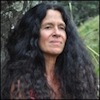Reihana Robinson’s “After the Fall or the Power of Reading” [Read the poem here] (First published in Issue #23 of Cha)
-This post is written by Reid Mitchell.

We confess. At Cha, we are fascinated with literary and artistic transformations, how stories must change as they move from one form to another or one culture to another. One of the founding editors will teach a course on this topic; many of us have moved from our homes to foreign lands, fallen in love with cultures—and people—we are not sure we understand, and faced the problem of translation. Rehanana Robinson’s “After the Fall or the Power of Reading” reimagines Barefoot Gen (はだしのゲン/Hadashi no Gen).
Barefoot Gen has already been reimagined many times; he has appeared in manga, novels, television shows, anime, and films. Furthermore, he is the original author’s imaginative reconstruction of his own youth; Keiji Nakazawa lived in Hiroshima and survived its atomic bombing. His work has been compared to Art Spiegalman’s Maus, by, among others, Spiegalman himself—but it strikes me that transforming your father’s experience into a graphic novel is radically different than transforming your own experience into one.
Now that I have told you all this, let me add that none of this knowledge is necessary to feel the poem and its power.
The first magic trick that Robinson performs does not concern Barefoot Gen. Rather it is a transformation of the reader. She immediately identifies you, the reader, as reader, as the subject of the poem. “You are a child and you are reading / Barefoot Gen.” There is no setting for where this act of reading is taking place; you are to locate it in your memory of your own childhood.
For Gen (after the fall) the Angels of Death flutter and storm
spilling and flooding first one city then
two
“After the Fall”—the phrase always invokes in me the idea of the Fall of Man. The Angel of Death first appears in western culture in Genesis, as the angel who kills the first-born of Egypt in the Passover story, and occurs in Christian and Islamic traditions. Here, however, the Judeo-Christian idea of The Fall is linked to the fall of the atomic bomb. That is not made explicit to you, the reader, if you do not know Barefoot Gen until the reference to the Enola Gay—although you may have surmised this when told that the Angels of Death flood “first one city then two.”
We also published this poem because of the strength of its language. It beats you on the head with forceful, even violent, verbs; we are told that “the Angels of Death use up verbs.” Indeed, they must as death, whether it completes an action, brings it to a stop.
what is to burn
what is to plunge
what is to kettle
what is to fry
what is to torque
to drill to sear to braise to bake to shrivel
to melt to blast to shrink to shadow
to suck to maim to bleed to horror
With “to horror,” the Angels of Death deform a noun into a verb, somehow stronger (because strange) than “to horrify” because it seems to mean to turn something into a horror. But the final deformed word is a verb, the verb “to live on,” so that survival seems the greatest curse.
Yet Barefoot Gen must be about survival.It is a story of what happens “after the fall” of Little Boy and Fat Man.
Robinson now decides to localize the poem—frankly, a decision I wish she had not made, as it pushes most of us away. She puts you, the reader, in Oriental Bay—which, Wikipedia informs me, is a suburb of Wellington, N.Z. (Editor’s note: Reihana is from New Zealand.) This is where your final transformation takes place.
you are no longer a child reading Barefoot Gen
You are wide-eyed and perplexed
under the innocent sky
Barefoot Gen
The subject of the poem, You, have become the subject of your reading, Barefoot Gen. This is of course what Aristotle calls for in is Poetics; it is the moment when Pity turns into Terror.
The transformative power of work of literature—not just to transform itself into other forms of literature, but to transform you, the reader—is asserted at the end of the poem, even if the transformation initially is bleak.It is a brilliant, daring maneuvere but we are left wondering—deliberately I suspect—whether Pity and Terror is enough. Bretold Brecht famously argued not only were they not enough; but that Catharsis was the enemy of Politics. After we become Barefoot Gen, where do we go?

 Reihana Robinson is a writer and artist and organic farmer living on the Coromandel in Aotearoa/New Zealand. Her writing has been published in the USA, Asia and New Zealand. Aue Rona is the title of her first volume published by Steele Roberts, NZ 2012. Cutthroat, Landfall and Takeahe are a handful of literary publications to carry her work. Anthologies include Te Ao Marama and Notes to the Transalators. Contact: reihanarobinson.co.nz
Reihana Robinson is a writer and artist and organic farmer living on the Coromandel in Aotearoa/New Zealand. Her writing has been published in the USA, Asia and New Zealand. Aue Rona is the title of her first volume published by Steele Roberts, NZ 2012. Cutthroat, Landfall and Takeahe are a handful of literary publications to carry her work. Anthologies include Te Ao Marama and Notes to the Transalators. Contact: reihanarobinson.co.nz
Leave a comment